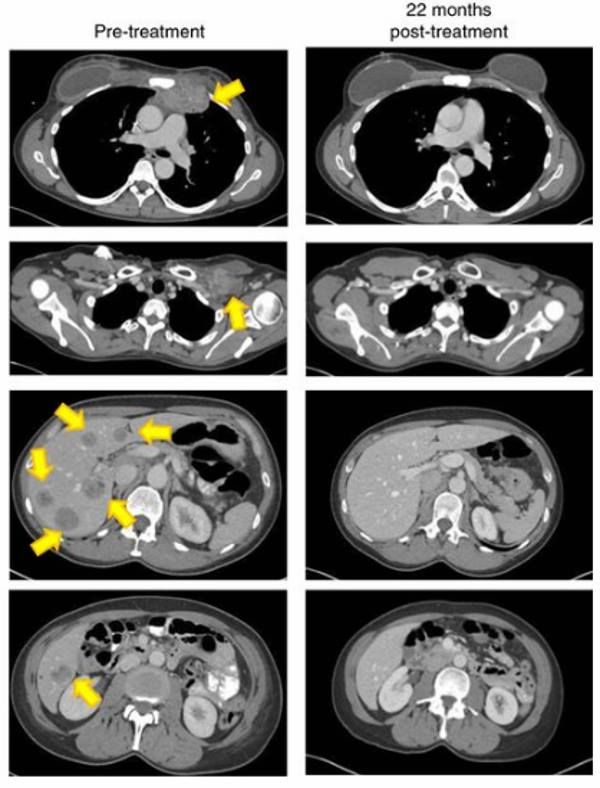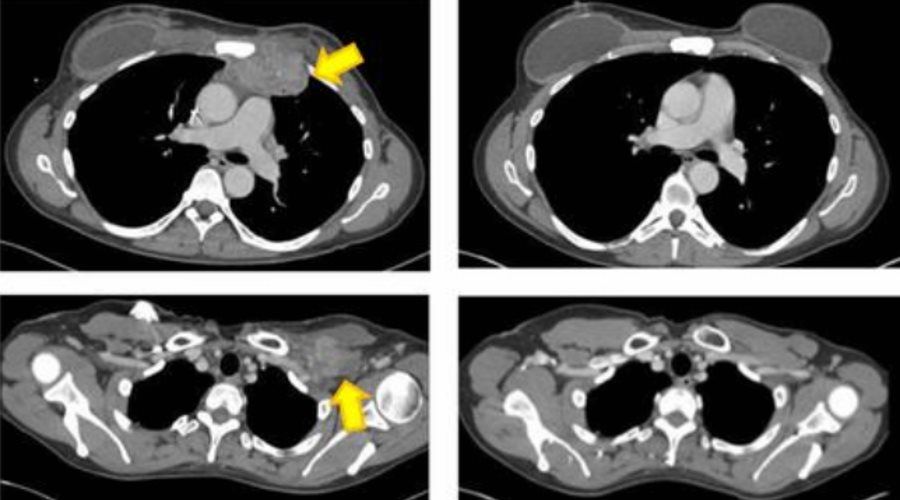The success of the experimental immunotherapy. Woman cured of breast cancer
This is the first case of a patient with advanced breast cancer being completely cured by immunotherapy using her own cellsor immune cells to find and destroy theotumor cells.
Judy Perkins was qualified for the pioneering therapy more than two years ago. By then, she had already undergone several chemotherapies, but without much successow. A tumor from her right breast has metastasizedoin the liver and on other organs. Doctors did not give her more than two years to live.
Doctors caring for the woman at the US National Cancer Institute in Maryland, said Perkins’ response was remarkable. The breakthrough therapy proved successful and the woman is free of the disease. – Moj condition was dire. I spent time probing not to move because the tumor was pressing on nerves and causing tremendous bol. I had already virtually given up – admitted Perkins. – After the treatment dissolved most of my tumorow, I was able to pojść na 60 kilometer wanderowka po gorach – added.
The unprecedented success has raised hopes that the therapy will also be effective in other patientsoin with advanced breast cancer and other difficult-to-treat cancers, such as tumoror ovaryow or prostate. Scientists are now planning large-scale clinical trials to evaluate how effective the treatment can be.
– We are at the threshold of a revolution to finally realize the elusive goal of being able to attack mnocancer mutations through immunotherapy – said Laszlo Radvanyi, director of the Ontario Institute for Cancer Research, whichory was not associated with the introduction of pioneering therapies.
But experts warn that the treatment proved effective in only one woman, and that clinical trials are needed to see how effective the treatment can be in other patientsoIn those suffering from cancer. They emphasize that although the treatment can essentially act on many roThe kind ofoin cancer, it will not necessarily help everyone.
In Perkins’ case, researchers first cut out small pieces of tissue from her tumorow and tested her DNA to find mutations specific to her type of cancer. They focused on mutations thatoreoThey carried four genes, whichore in turn produced a number of abnormal proteins in the tumors. The doctors then isolated the comor immune cells called lymphocytes infiltrating tumoror (Tumor-infiltrating lymphocytes – TIL). These are comorki of the patient’s immune system, whichore attacked the tumor to eliminate it, but failed because they were too weak or too small.
After growing a billionoin these comoimmune recs in the lab, scientists conducted their study to find among theod them those whoore most effectively fought against comor cancerous women, identifying their abnormal proteins. Researchers then injected about 80 billion into Perkins’ bodyoIn carefully selected comoimmune records grown in the lab.
Com therapyoThe immune response was conducted roin parallel with the administration of an agent called pembrolizumab, whichory is a standard drug to help the immune system attack tumorsow. After 42 weeks, Perkins was cured and no recurrences have been detected so faroin disease.

– Feels wonderful and I am surprised that I am cancer free. I resigned from my job and planned to die. I already had a list of things thatore I wanted to do before the end came, like seeing the Grand Canyon, etc. – explained Perkins. – Now wroct to a normal life – added.
The therapy used on the woman is not yet fully worked out. Doctors whooThose who developed it are not sure how many implanted comoimmune rec has contributed to defeating cancer. The use of pembrolizumab in the past has also not shown any great efficacy in advanced breast cancer. All this needs to be studied and conclusions drawn.
Doctors’ success described in magazine „Nature Medicine” is all the more remarkable because breast cancers, such as prostate and ovarian cancers, have relatively few mutations, making them harder for the immune system to locate.
Alan Melcher, an immunotherapy expert at the Institute of Cancer Research in London, stressed that the therapy is complex and expensive, and, more importantly, requires doctors to find enough lymphocyteoIn TIL in a patient’s tumor to make treatment effective. – The problem with similar therapies in the past has been that doctors have not been able to grow enough of the right comorec of the immune system. In many patientow, there are not enough of them to even start breeding – pointed out Melcher, ktory was not related to the introduction of the treatment.
Other experts roThey are also cautious about the outcomeoat Perkins. – This is an extremely promising therapy, but it needs to be repeated,osee this effect in other patientsow, before giving them hope for a new immunotherapy for incurable metastatic breast cancer. We are all excited about the results of the treatment, but we must remember that this type of immunotherapy remains an experimental approach, whichore has a long way to go before it becomes available to patientsow – stated Simon Vincent of Breast Cancer Now.
